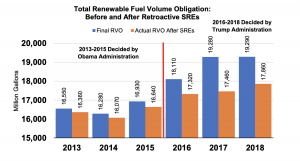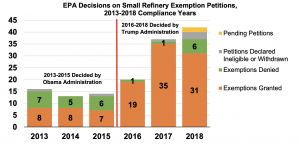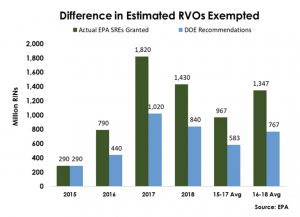Reuters reported Tuesday that "the top U.S. oil and corn industry lobby groups said on Tuesday they were suing the administration of President Joe Biden over its plans to slash…
Small-Refinery Exemptions Discussed at House Committee Hearing
Reuters writer Richard Valdmanis reported this week that, “The U.S. oil and corn industries continued a long-running public battle over America’s biofuels policy on Tuesday during a Congressional hearing about the Trump administration’s use of ‘secret waivers‘ for refineries.
Today my Committee is holding a hearing on the Trump Administration’s undercutting of the Renewable Fuel Standard. @POTUS is captive to the oil industry, and it is exacerbating the #ClimateCrisis and devastating rural communities working hard to produce our ethanol. pic.twitter.com/guNaaaR9Ic
— Rep. Frank Pallone (@FrankPallone) October 29, 2019
“Representatives of the biofuels sector accused the administration of ‘rampant abuse‘ of the so-called Small Refinery Exemptions (SRE) freeing refineries from their annual ethanol blending obligations, while the nation’s top refining association argued the program was critical to national security by keeping petroleum fuel producers in business.
But the two sides agreed on one thing: the administration’s recent proposal to remedy the small refinery waiver issue by forcing some bigger refineries to make up for the exempted volumes was a disappointment.
The article noted that, “Geoff Cooper, the head of the Renewable Fuel Association, called it a ‘bait and switch’ that did not go far enough to ‘bring idled (biofuel) plants back online.'”

The Reuters article explained that, “Trump’s Environmental Protection Agency (EPA) has vastly expanded its use of the waivers, which are issued confidentially, triggering a backlash among representatives of the corn industry who claim the exemptions are lucrative handouts to Big Oil and hurt farmers by cutting ethanol blending volumes.

“After picking up on the corn industry’s anger, Trump promised a ‘giant package’ to remedy the issue. Early this month, the EPA unveiled the plan, which would increase the amount of ethanol some oil refineries must blend next year to make up for volumes it has waived.
“Biofuels companies have instead reacted angrily – saying the proposal failed to make up for the impact of the waiver program so far and fell short of the administration’s promises. The industry had expected the EPA to calculate the increased volumes by using the three-year average of volumes waived under the SRE program, but it instead said it would use the three-year average of volumes that the Department of Energy had recommended that the EPA waive – a lower number.”

DTN writer Todd Neeley reported on Tuesday that, “Siouxland Energy Cooperative in Iowa has experienced firsthand the recent ups and downs of the Renewable Fuel Standard.
“When the EPA granted 31 new small-refinery exemptions on Aug. 9, it was the final straw for the corn-ethanol plant. Company officials were left with no choice but to shut down production.”
This is one of the toughest things I have ever had to do." @NieuwenhuisSeed on being forced to idle his plant and furlough his employees because of @EPA's refinery exemptions. pic.twitter.com/8Pm7VOyUR3
— Growth Energy (@GrowthEnergy) October 29, 2019
Mr. Neeley explained that, “The U.S. House of Representatives Committee on Energy and Commerce on Tuesday examined the effects 85 small-refinery exemptions have had on biofuels and agriculture since 2016, during a hearing on the proposed Renewable Fuel Standard Integrity Act of 2019.
“The legislation would, among other things, require the EPA to make available more information on refinery exemptions.”
I agree. I attended the @HouseCommerce hearing on our #RFS bill this morning–it was a solid first step. https://t.co/4sudKXZ09c pic.twitter.com/6XXcWBkOaq
— Rep. Dusty Johnson (@RepDustyJohnson) October 29, 2019
Mr. Neeley noted that, “Primghar, Iowa, farmer Kelly Nieuwenhuis, president of Siouxland Energy, told the committee increased transparency on the exemptions process would help.
“‘We’ve had farm subsidies and everyone sitting in this room can go online and see how much I’ve seen in farm subsidies,’ Nieuwenhuis said. ‘I think small-refinery exemptions should be transparent.'”
The Trump Administration has overseen year-over-year increases in domestic fuel ethanol production, to the highest level in history and the United States exported a record volume of ethanol in 2018 for the second consecutive year. https://t.co/wM64nDmGjU
— U.S. EPA (@EPA) October 29, 2019
Mr. Neeley indicated that, “During the hearing Chet Thompson, president and chief executive officer of the American Fuel and Petrochemical Manufacturers, said data from the U.S. Energy Information Administration show the blend rate is at its highest level in history at 10.2% — effectively undermining claims of lost demand.
“‘Contrary to the premise of today’s hearing and much of the narrative around this issue, however, small-refinery waivers have not had any demonstrable impact on domestic biofuels demand, which is at or near record highs,’ Thompson said.”
The DTN article added that, “Gene Gebolys, founder, president and chief executive officer of biodiesel producer World Energy, said his company has experienced the ill effects of small-refinery exemptions.
“‘The impact on the industry is devastating,’ he said.”
EPA continues to implement the Renewable Fuel Standard program in accordance with the Clean Air Act, taking into consideration additional direction from Congress, recommendations from Department of Energy, and relevant court decisions. https://t.co/lglaIH8BlW
— U.S. EPA (@EPA) October 29, 2019
And O. Kay Henderson reported on Tuesday at Iowa Public Radio Online that, “A bipartisan group of lawmakers, including Congressman Dave Loebsack of Iowa City, have proposed legislation that would force the EPA to publicly disclose which small refineries get a pass on blending ethanol into gasoline as well as the economic basis for those decisions.”
Today the Committee heard how the Trump @EPA has been undermining the Renewable Fuel Standard by granting roughly *four times* the typical number of waivers – in secret – to oil refineries. America’s farmers, who produce our ethanol, are suffering as a result. pic.twitter.com/yDqLmWEcAK
— Energy and Commerce Committee (@EnergyCommerce) October 29, 2019
Ms. Henderson also pointed out that, “A spokesman for the oil industry told committee members the Renewable Fuel Standard is ‘a threat’ to small refineries.
“‘Our nation’s more than 50 small refiners are national security assets. They’re critical sources of our fuel supply. They employ tens of thousands of woman and men across the country and they are the lifebloods, again, of communities all across the country,’ said Chet Thompson, president and CEO of The American Fuel and Petrochemical Manufacturers.
“He accused the ethanol industry of distorting the impact of the EPA’s waivers to small oil refineries.”







